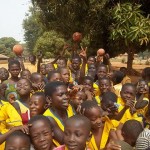Posted by Kwabena Amponsah
Ahead of the one-year anniversary of South Sudan’s independence, the United Nations Children’s Fund (UNICEF) today called for the rights of children to be made a priority, stressing that they are vital for the young nation’s growth and stability.
“The foundation of a peaceful and prosperous South Sudan can be strong only if we invest in the country’s youngest citizens,” UNICEF’s Representative in South Sudan, Yasmin Ali Haque, said in news release. “They need to be everyone’s priority so that the next generation can play an active and meaningful part in building this new nation.”
South Sudan became independent from Sudan on 9 July last year, six years after the signing of a peace agreement that ended decades of warfare between the north and south. Half of its population is currently under the age of 18, yet the country has very poor social indicators, including high maternal and infant mortality, high rates of illiteracy and malnutrition, and very limited infrastructure, making it one of the riskiest places in the world for a child to be born.
“The measurement of progress must be in terms of concrete results for children,” said Ms. Haque. “We need to improve children’s chances to survive beyond their fifth birthday, to have a chance to go to school and to be protected from violence and conflict.”
According to UNICEF, 70 per cent of children between six and seventeen years of age have never been to school, and the completion rate in primary schools is barely ten per cent, one of the lowest in the world. Girls, in particular, remain disadvantaged when it comes to education and are vulnerable to social practices such as early marriage and early child bearing.
In addition, the multiple crises in the country have left many children without basic services, with only 13 per cent of them having access to adequate sanitation.
UNICEF, in conjunction with the Government and development partners, has worked on establishing essential water and sanitation sources, as well as education infrastructure. In five years, there has been a 40 per cent increase in access to improved sources of drinking water, and over the past year, efforts have been intensified to ensure that children in some of the more disadvantaged schools have a friendlier learning environment.
UNICEF noted that outstanding issues between Sudan and South Sudan continue to have an impact on children. Since South Sudan’s independence, the peace between the two countries has been threatened by clashes along their common border and post-independence issues, including the ownership of the Abyei area which straddles the two countries, causing the displacement of thousands of hundreds of people.
The ongoing flux of refugees, the continued threat of conflict and severe food insecurity make it more pressing to address their needs, UNICEF added.
UN News
Give Back Africa Foundation is committed to helping children in underprivileged communities reach their academic goals and achieve their personal potentials. . Please join us in this mission

